动词的时态语态复习学案
人教版小学英语四年级下册 《动词的时态和语态》教案

人教版小学英语四年级下册《动词的时态和语态》教案一、教学目标1.掌握动词的时态和语态的基本概念;2.能够正确使用一般现在时、一般过去时和将来时;3.能够理解和使用主动语态和被动语态。
二、教学内容1.动词的时态:一般现在时(Simple Present ___)一般过去时(Simple Past ___)将来时(Future ___)2.动词的语态:主动语态(Active Voice)被动语态(Passive Voice)三、教学步骤步骤一:导入新知1.引导学生回顾一般现在时的用法和句子结构,并与其它时态进行比较。
步骤二:学习时态1.介绍一般过去时和将来时的用法,并让学生观察和分析相应的句子例子。
2.组织学生进行练习,巩固并加深对时态的理解和应用。
步骤三:学习语态1.引导学生理解主动语态和被动语态的概念并进行比较。
2.讲解被动语态的结构和使用,并通过例句进行讲解。
3.练习使用被动语态,培养学生灵活运用语态的能力。
步骤四:巩固综合练习1.组织学生进行综合练习,巩固所学的动词时态和语态。
可以采用填空、对话、句子改写等形式。
步骤五:作业布置1.布置适当的作业,要求学生用所学的动词时态和语态完成相应的练习题。
2.鼓励学生自主学习,复习并巩固所学的内容。
四、教学评估1.教师根据学生在课堂上的表现,对其掌握程度进行评估。
2.学生完成作业后,教师进行作业评价和反馈。
五、教学延伸1.鼓励学生扩展自己的词汇量和语法知识,提高英语应用能力。
2.引导学生运用所学的动词时态和语态进行口语和写作练习,提高语言表达能力。
以上是《动词的时态和语态》的教案内容,通过系统的教学安排和练习,能够帮助学生更好地理解和运用动词的时态和语态。
注意:以上内容供参考,具体教学内容和步骤可以根据实际情况进行调整和优化。
(完整版)高三英语复习教案:动词时态和语态
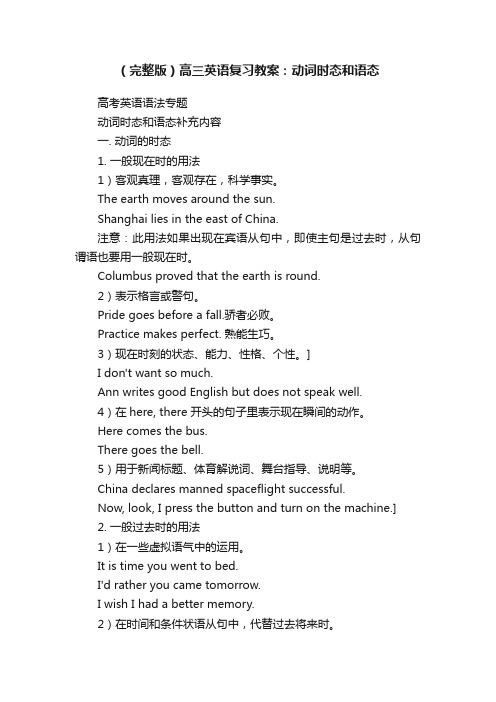
(完整版)高三英语复习教案:动词时态和语态高考英语语法专题动词时态和语态补充内容一. 动词的时态1. 一般现在时的用法1)客观真理,客观存在,科学事实。
The earth moves around the sun.Shanghai lies in the east of China.注意:此用法如果出现在宾语从句中,即使主句是过去时,从句谓语也要用一般现在时。
Columbus proved that the earth is round.2)表示格言或警句。
Pride goes before a fall.骄者必败。
Practice makes perfect. 熟能生巧。
3)现在时刻的状态、能力、性格、个性。
]I don't want so much.Ann writes good English but does not speak well.4)在here, there 开头的句子里表示现在瞬间的动作。
Here comes the bus.There goes the bell.5)用于新闻标题、体育解说词、舞台指导、说明等。
China declares manned spaceflight successful.Now, look, I press the button and turn on the machine.]2. 一般过去时的用法1)在一些虚拟语气中的运用。
It is time you went to bed.I'd rather you came tomorrow.I wish I had a better memory.2)在时间和条件状语从句中,代替过去将来时。
Mother said I couldn’t watch TV before my homework was finished.3)情态动词could, would表示委婉语气。
Could you lend me your bike?Would you help me?4) used to do/ wouldused to do “过去常常”,表示过去习惯性的动作或状态。
高中时态语态归纳总结导学案高考英语一轮复习
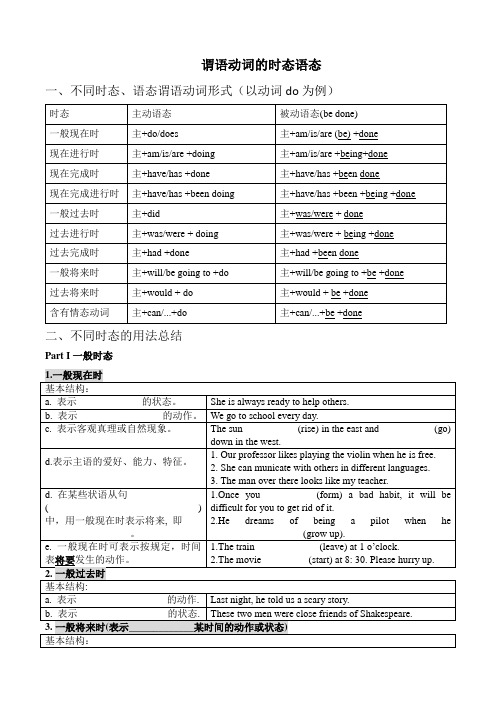
谓语动词的时态语态一、不同时态、语态谓语动词形式(以动词do为例)二、不同时态的用法总结Part I一般时态三、被动语态时态语态专练一.画出下列句子(包括从句)中的谓语动词,并写出其时态语态。
1.This afternoon, we had our chemistry class in the science lab.2. She is studying at an American high school for a year.3. My name is Adam and I’m a freshman at senior high school.4. You should encourage your friend to try new hobbies.5. There, a boat will take you to stay with a local Urus family on an island for three days.6. I’ve been studying English since primary school.7. The team that Lang Ping had built was falling apart.8. One of the best players had been injured, and the team captain had to leave because of heart problems.9. Foreign aid is being organized for the tsunamihit countries.10. China’s ancient civilization has continued all the way through into modern times.11. Some of the symbols can still be seen in today’s hanzi.12. Listening to English radio programme helps me to get used to an English language environment.13. Water from the dam would likely damage a number of temples and destroy cultural relics.14. A mittee was established to limit damage to the Egyptian buildings and prevent the loss of cultural relics.15. Nearly 500,000 highquality digital photographs have been produced since the international project started in 1994.16. Billions of trees are being cut down every day to make paper for humans.17. I sincerely hope that you will be admitted to your ideal university.18. When I was a little child, I once said to my grandmother that I would buy her a big house. 二.用括号里动词的正确形式填空1. A meeting _____________(hold) in Nanjing from March 22 to 24, 2023.2. Then, one day in 1945, Marcel ____________(give) another opportunity by the mountain.3. Since then, Marcel __________(make) mountain climbing his life’s work.4. Spending too much time online ________(make) it difficult to focus on other things in life.5. When I got to the theater, I found out that the tickets __________________________(sell out).6. In the last few years, thousands of films ________________________(produce) all over the world.7. In the near future, more advances in science technology _______________________(make) by scientists.8. The experts are discussing how the cultural relics can _________(save).9. With the help of my teacher, I __________(make) great progress in English so far.10. Tom _________(visit) his grandparents every weekend.11. The problem ______________(solve) sooner or later.12. I ______________(do) my homework in my room as usual when I heard someone screaming.13. The pany _____________(develop) a new app and it will appear on the market next year.14. I went to Ningxia and __________(stay) there for a year.15. Could I use your car? Mine ________________(repair) in the garage now.16. The book __________________(translate) into many languages since it _____________(publish) in 1973.17. He promised that he_____________(marry) me, but three months later he went abroad.18. An autumn outing _______________(hold) next Friday by our school to enrich our school life .19. The China International Search and Rescue Team (CISAR) ____________(form) in 2001 and is now made up of several hundreds of rescue workers and about 20 sniffer dogs.20. Rescue workers ___________(train) to find people, treat injuries, and hand out food, water, and other supplies.21. In 1961, the first temple __________(move) by German engineers.22. When the project ended in 1980, it ___________(consider) a great success.23. This semester is about to end. M y parents and I ______________(travel) to Xi’an this winter vocation.24. On most Sundays, the sounds of hammers and other tools striking stones can ____________(heard) in Xochiaca, an ancient village in Mexico.25. The ChineseCanadian _______(win) the 18th International Chopin Piano petition in Warsaw in 2021 at the age of 24.。
高考复习学案-动词时态语态的基本结构和用法
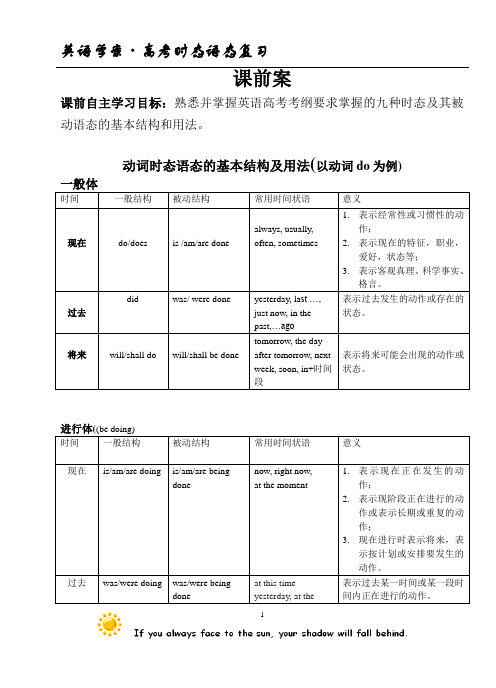
课前案课前自主学习目标:熟悉并掌握英语高考考纲要求掌握的九种时态及其被动语态的基本结构和用法。
动词时态语态的基本结构及用法(以动词do为例)1(have done)2课堂案时态语态题的解题思路1.这个动作可能发生在什么时间?题干中可参照的时间信息有哪些?2.这个动作处于什么状态?是进行中, 还是已结束(完成)?3.这个动作与主语的关系,是主动还是被动?直击高考Part1. 用括号内单词的正确形式填空。
1.时态语态题在语法填空中的考查语法填空题提示词为动词时,若句中没有谓语动词,或者虽然已有谓语动词,但需填的动词与之是并列关系时,所给动词就是谓语动词,就要考虑时态语态。
1.I feel so excited! At this time tomorrow morning I ________(fly) to Shanghai.(2012辽宁)2.—Do you think Mom and Dad ________ (be) late?—No, Swiss Air is usually on time.(2013北京高考)3.Bob called to tell his mother that he couldn’t ent er the house, for he __________ (leave) his key at school.(2013上海高考)4.Hurry up, kids! The school bus __________ (wait) for us.(2013四川高考)5.I felt very tired when I got home, and I __________ (go) straight to bed.(2013重庆高考)6. During the last three decades, the number of people participating in physical fitness programs__________(increase)sharply.(2013浙江)7.—Tony, why are your eyes red?—I__________ (cut) up peppers for the last five minutes. (2014江西卷)8. Yangshuo ______ (be) really beautiful. (2015全国I卷)3Part2. 单句改错。
高三英语语法复习教案动词时态语态
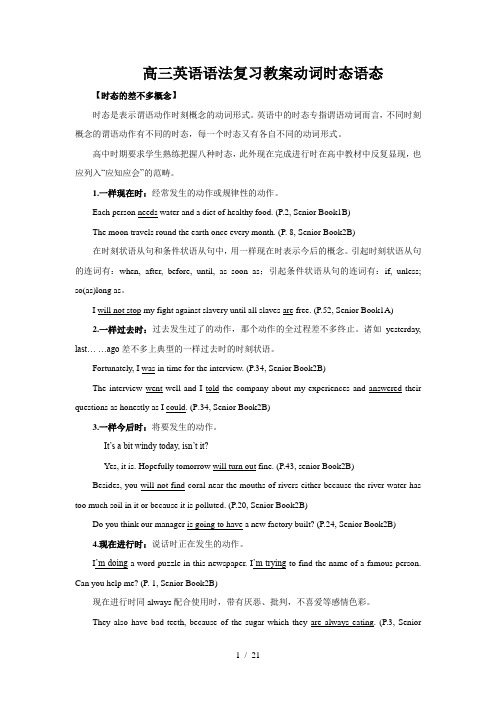
高三英语语法复习教案动词时态语态【时态的差不多概念】时态是表示谓语动作时刻概念的动词形式。
英语中的时态专指谓语动词而言,不同时刻概念的谓语动作有不同的时态,每一个时态又有各自不同的动词形式。
高中时期要求学生熟练把握八种时态,此外现在完成进行时在高中教材中反复显现,也应列入“应知应会”的范畴。
1.一样现在时:经常发生的动作或规律性的动作。
Each person needs water and a diet of healthy food. (P.2, Senior Book1B)The moon travels round the earth once every month. (P. 8, Senior Book2B)在时刻状语从句和条件状语从句中,用一样现在时表示今后的概念。
引起时刻状语从句的连词有:when, after, before, until, as soon as;引起条件状语从句的连词有:if, unless; so(as)long as。
I will not stop my fight against slavery until all slaves are free. (P.52, Senior Book1A)2.一样过去时:过去发生过了的动作,那个动作的全过程差不多终止。
诸如yesterday, last… …ago差不多上典型的一样过去时的时刻状语。
Fortunately, I was in time for the interview. (P.34, Senior Book2B)The interview went well and I told the company about my experiences and answered their questions as honestly as I could. (P.34, Senior Book2B)3.一样今后时:将要发生的动作。
时态与语态导学案-高三英语一轮语法复习
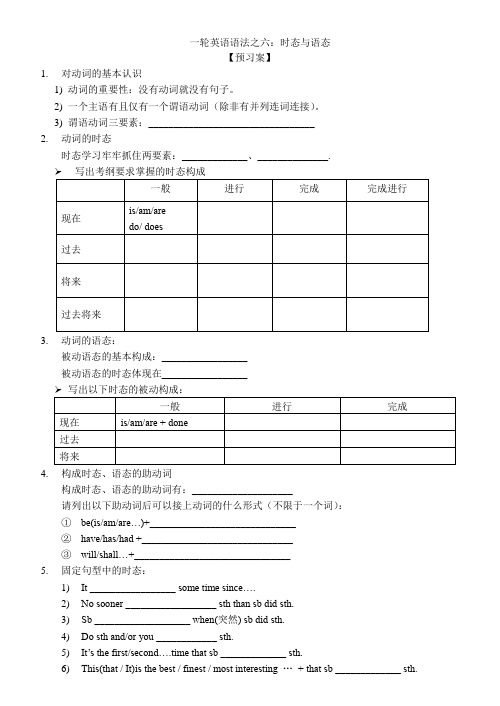
一轮英语语法之六:时态与语态【预习案】1.对动词的基本认识1)动词的重要性:没有动词就没有句子。
2)一个主语有且仅有一个谓语动词(除非有并列连词连接)。
3)谓语动词三要素:_________________________________2.动词的时态时态学习牢牢抓住两要素:_____________、______________.3.动词的语态:被动语态的基本构成:_________________被动语态的时态体现在_________________4.构成时态、语态的助动词构成时态、语态的助动词有:____________________请列出以下助动词后可以接上动词的什么形式(不限于一个词):①be(is/am/are…)+_____________________________②have/has/had +______________________________③will/shall…+_______________________________5.固定句型中的时态:1)It _________________ some time since….2)No sooner __________________ sth than sb did sth.3)Sb ___________________ when(突然) sb did sth.4)Do sth and/or you ____________ sth.5)It’s the first/second….time that sb _____________ sth.6)This(that / It)is the best / finest / most interesting …+ that sb _____________ sth.7)By the time sb did sth, sb ________________ .8)If sb ________ sth, sb will do sth.【当堂训练】1.选择题1)【2017·天津卷】I ________down to London when I suddenly found that I was on the wrongroad.A. was drivingB. have drivenC. would driveD. drove2)【2021年天津卷】Mark is a genius. By the time he graduated, he ________ jobs by a dozenputer panies.A. has offeredB. has been offeredC. had offeredD. had been offered3)【2018·北京】China’s highspeed railways _________ from 9,000 to 25,000 kilometers in thepast few years.A. are growingB. have grownC. will growD. had grown4)【2017·北京卷】People______ better access to health care than they used to, and they’reliving longer as a result.A. will haveB. haveC. hadD. had had5)【2017·北京卷】In the 1950s in the USA, most families had just one phone at home, andwireless phones _______ yet.A. haven’t inventedB. haven’t been inventedC. hadn’t inventedD. hadn’t been invented6)【2017·北京卷】—______ that pany to see how they think of our product yesterday?—Yes. They are happy with it.A. Did you callB. Have you calledC. Will you callD. Were you calling7)【2018·天津】My washing machine ___________this week, so I have to wash my clothes byhand.A. was repairedB. is repairedC. is being repairedD. has been repaired2.填空:1)Unless some extra money__________ (find), the theatre will be close.2)The reports went missing in 2012 and nobody __________ (see) them since.3)I found the lecture hard to follow because it ________ (start) when I arrived.4)What time is it?I have no idea. But just a minute, I __________ (check) it for you.5)We won’t start the work until all the preparations _______________ (make).6)It is the most important invention that _____________(use) in cars.7)My teacher said that light_______________(travel) much faster than sound.8)It was raining when they______________(leave) the station.9)In the past years, great changes___________________(发生, take) in my home town.10)The boy was _________________ (取笑, fun) by his classmates.【巩固练习】1.填空1)On Monday mornings it usually ______________ (take) me an hour to drive to work althoughthe actual distance is only 20 miles.2)Hi, let’s go skating.Sorry, I’m busy right now. I ___________ (fill) in an application form for a new job.3)They made up their mind that they___________ (buy) a new house once Larry changed jobs.4)She ____________ (phone) someone, so I nodded to her and went away.5)Nowadays, cycling, along with jogging and swimming, ____________ (regard) as one of thebest allround forms of exercise.6)By the time Jack returned home from England, his son _______________ (graduate) fromcollege.7)Today, it is much easier to be healthy than it _______ in the past.8)He said it was the second time that he ________________(receive) such a gift.9)In the near future, more advances in the robot technology ______________(make) byscientists.10)His sister left home in 2007, and ___________________(没有收到...的消息, hear) since.11)It is five years since I___________(leave) my hometown.2.短文填空Dear friend,When we learned over the radio and in the newspapers that Hetian County of the Xinjiang Uygur Autonomous Region _____________ (strike) by a terrible earthquake on February 17th, 2014, making more than 7800 people injured, we ____________ (bee) very worried and sad. It ___________ (say) that thousands of houses _________________(destroy) , so you can’t have your classes as usual at present. I wonder if things ________________ (improve) by now.I’d like to send you some books which ______________ (buy) last week. I hope they __________ (be) of some help to your study.As for yourself, don’t lose heart and do be strongminded when facing the great disaster, for people all over the country ______________ (stand) by you. And please keep in touch with me andI will try my best to help you. In addition, the government ___________ (try) to help the people inthe disasterhit areas rebuild their homes. I believe the day will soon e when you overe all the difficulties and live a new happy life.I _____________ (look) forward to hearing from you.Yours truly,Li Ming近五年高考真题汇编一、2023年高考真题1.(2023年新高考II卷)As a little girl, I _________ (wish) to be a zookeeper when I grew up.2.(2023年浙江卷1月)Citizens of higher social classes (permit) to live closer to the center of the circles.3. (2023年浙江卷1月)The large siheyuan of these highranking officials and wealthy businessmen often______ (feature) beautifully carved and painted roof beams and pillars(柱子).二、2022年高考真题1.(2022新高考I卷)The plan will extend protection to a significant number of areas that _________ (be) previously unprotected, bringing many of the existing protected areas for giant pandas under one authority to increase effectiveness and reduce inconsistencies in management.2.(2022新高考II卷)Henry ___________ (fix) his car when he heard the screams. He looked up and saw Eric hanging from the balcony.3.(2022新高考II卷)He looked up and saw Eric hanging from the balcony. He quickly ___________ (throw) his tools aside, and started running, arms out.4.(2022全国甲卷)In the last five years, Cao __________ (walk) through 34 countries in six continents, and in 2016, he reached the top of Kilimanjaro, Africa’s highest mountain.5.(2022全国乙卷)The chairman of the China Culture Promotion Society ___________ (address) the opening ceremony. “As a main promoter of the International Tea Day, the birthplace of tea and the largest teaproducing country, China has a responsibility to work with other countries to promote the healthy development of the tea industry. It can help to build a munity with a shared future for mankind,” he said.6.(2022北京卷)Eventually, the man ___________ (catch) up with her, and he was only trying to return her wallet!7.(2022北京卷)This has been adopted to ensure easier detection of gas leaks. Gas naturally ___________ (have) no recognisable smell. However, a strong smell is added so that we can raise the alarm when we detect the smell associated with danger.8.(2022北京卷)The use of those plastics ___________ (increase) by 300% since 2019. The world won’t survive if this situation continues.9.(2022浙江1月卷)But Cobb and others ___________ (be) now questioning that idea pushing conferences to provide more chances to participate remotely, and changing their personal behavior to do their part in dealing with the climate change crisis.10.(2022浙江1月卷)On a website called No Fly Climate Sci, for example, roughly 200 academics many of them climate scientists ___________ (promise) to fly as little as possible since the effort started two years ago.三、2021年高考真题1.(2021年新高考I卷)You can’t help wondering how hard it________ (be) for the people then to put all those rocks into place.2.(2021新课标II卷)Whenever I heard of businesses using plastic, I’d send an email. One of the biggest panies I wrote to ________ (be) Alaska Airlines Paris.3. (2021年浙江卷6月)It doesn't impress like George Washington's plantation on the Pohomac, but Lincoln's home in downtown Springfield, Illinois, __________ (prove) irresistible to visitors since it opened to the publie. )4. (2021年浙江卷1月)Mary’s niece wrote, “The little home __________(paint) white. It was sweet and fresh. Mary loved it.”5. (2021年浙江卷1月)After Lincoln was elected President of the US in 1861, they rented the house and ____________ (sell) most of their furniture.6. (2021年浙江卷1月)It is calculated by dividing a person’s weight in kg by their height in meters squared, and a BMI of between 19 and 25 ___________ (consider) healthy.7. (2021年浙江卷1月)The study found that between 1985 and 2017, average rural BMI increased by 2.1 in women and men. In cities, however, the gain _________ (be) 1.3 in women and 1.6 in men.8. (2021年北京高考)As it __________ (connect) things, your brain turns them into a story, and you get a dream.9. (2021年北京卷)There __________(be) a dramatic rise in the number of extreme weather events over the past 20 years, caused largely by rising global temperatures, according to a new report from the United Nations.四、2020年高考真题1.(2020·新课标I卷语法填空)The unmanned Chang’e4 probe (探测器)—the name was inspired byan ancient Chinese moon goddess 61.___ (touch) down last week in the South PoleAitken basin.2.(2020·新课标I卷语法填空)"This really excites scientists,"Carle Pieters, a scientist at BrownUniversity, says, "because it 67. ____ (mean) we have the chance to obtain information about how the moon 68. ___ (construct) ."3.(2020·新课标II卷短文改错)Actually, I start to learn kung fu when I was seven years old, but I havelong been out of practice.4.(2020·新课标III卷语法填空)The artist was sure he would 63. (choose), but when hepresented his masterpiece to the emperor’s chief minister, the old man laughed.5.(2020·新课标III卷语法填空)65(When/As)he asked the villagers on the banks of the river wherehe could find the legendary (传奇的) artist, they smiled and 66. (point) down the river.6.(2020·浙江卷语法填空)And, as more children were born, more food 59. (need).7.(2020·浙江卷语法填空)By about 6000 BC, people 61. _ (discover)the best crops to growand animals to raise.8.(2020·浙江卷语法填空)New methods 65. (mean)that fewer people worked in farming.9.(2020·山东卷语法填空)The 80,000 objects collected by Sir Hans Sloane, for example, 38. .(form) the core collection of the British Museum 39(which/that)opened in 1759.10.(2020·山东卷语法填空)The parts of a museum open to the public 40. (call) galleriesor rooms.11.(2020·天津卷单项填空)—You are a great swimmer.—Thanks. It’s because I _______ a lot these days.A.have been practisingB.was practisingC.would practiseD.had practised12.(2020·天津卷单项填空)The number of medical schools reached 18 in the early 1990s and__________ around that level since.A.are remainingB.have remainedC.is remainingD.has remained13.(2020·江苏卷单项填空)If you look at all sides of the situation, you’ll find probably a solution that______ everyone.A. suitB. suitedC. suitsD. has suited14.(2020·江苏卷单项填空)Instead of getting down to a new task as I _____, he examined the previouswork again.A. had expectedB. have expectedC. would expectD. expect五、2019年高考真题1.【2019·江苏卷·单项填空】22.The musician along with his band members ___________ tenperformances in the last three months.A. givesB. has givenC. have givenD. give2.A few months after he had arrived in China, Mr. Smith ___________ in love with the people andculture there.A. would fallB. had fallenC. has fallenD. fell3.【2019·江苏卷·单项填空】33.They are trying to make sure that 5G terminals_________ by 2022 forthe Beijing Winter Olympics.A. will installB. will have been installedC. are installedD. have been installed4.【2019·天津卷·单项填空】2.I __________ to send Peter a gift to congratulate him on his marriage, butI couldn't manage it.A. had hopedB. am hopingC. have hopedD. would hope5.【2019·天津卷·单项填空】8.Amy, as well as her brothers, ____________ a warm wele when returningto the village last week.A. is givenB. are givenC. was givenD. were given6.【2019·新课标I卷·语法填空】Of the nineteen recognized polar bear subpopulations, three aredeclining, six (be) stable, one is increasing, and nine lack enough data.7.【2019·新课标II卷·语法填空】Picking up her“Lifetime Achievement”award, proud Irene _________ ____(declare) she had no plans __to retire__ (retire) from her 36yearold business.8.【2019·新课标II卷·语法填空】I don't see any reason to give up work. I love ing here and seeing myfamily and all the friends I ___ ___(make) over the years9.【2019·新课标III卷·语法填空】Our hosts shared many of their experiences and__________(remend) wonderful places to eat, shop, and visit. For breakfast, we were able to eat papaya(木瓜)and other fruits from their trees in the backyard.10.【2019·新课标III卷·语法填空】On the last day of our weeklong stay, we ___________ (invite)toattend a private concert on a beautiful farm on the North Shore under the stars。
动词的时态和语态教案
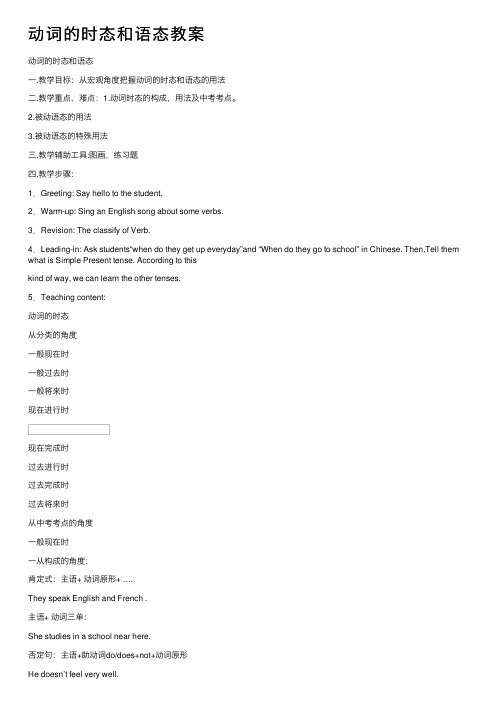
动词的时态和语态教案动词的时态和语态⼀.教学⽬标:从宏观⾓度把握动词的时态和语态的⽤法⼆.教学重点,难点:1.动词时态的构成,⽤法及中考考点。
2.被动语态的⽤法3.被动语态的特殊⽤法三.教学辅助⼯具:图画,练习题四.教学步骤:1.Greeting: Say hello to the student.2.Warm-up: Sing an English song about some verbs.3.Revision: The classify of Verb.4.Leading-in: Ask students“when do they get up everyday”and “When do they go to school” in Chinese. Then,Tell them what is Simple Present tense. According to thiskind of way, we can learn the other tenses.5.Teaching content:动词的时态从分类的⾓度⼀般现在时⼀般过去时⼀般将来时现在进⾏时现在完成时过去进⾏时过去完成时过去将来时从中考考点的⾓度⼀般现在时⼀从构成的⾓度:肯定式:主语+ 动词原形+ ….They speak English and French .主语+ 动词三单:She studies in a school near here.否定句:主语+助动词do/does+not+动词原形He doesn’t feel very well.⼀般疑问句: Do/does+主语+动词原形Do you speak English?回答: Yes,主语+do/doesNo,主语+don’t/doesn’t实义动词have当”有”讲时,疑问句有以下变化形式:Have you a penfriend?Do you have a penfriend ?Have you got a penfriend?特殊疑问句:特殊疑问词(where,when,how,why)+do/does+主语+动词原形(不⽤yes,no回答)Where does ZhouNan study?选择疑问句:Do you like this book or that one?⼆从⽤法的⾓度:1.表⽰经常性,习惯性的动作或经常存在的状态,常与always,often,usually,everyday,sometime等连⽤(通常⽤于be后,⾏为动词前)e.g.)Lei Feng is always ready to help other.I am always/usually go to school at 7 o’clock.2.表⽰普遍性的真理与规律The moon goes round the esrth.⽉亮绕着地球转.Light travels faster than sound.3.表⽰习惯与能⼒Do you drive a car? 你会开车吗?Mr Green teaches English.4.表⽰按规定,计划或安排预计要发⽣的动作或存在状态(主要⽤于come,go,leave,begin,start,arrive,return等瞬间动词)Could you tell me what time the plan leaves?Do you know what time the plan arrives in Moscow?5.在时间,条件状语从句中表⽰将来动作When you climb higher, you’ll find nothing grows there at all.Tom won’t feel well till the game is over.6.⼀般现在时表将来表最近的将来,说话⼈说话时动作并未发⽣,但即将开始(I’m off now .)或强调未来的事实和早已规定的事. ( Tomrrow is Sunday.)特殊⽤法⾓度:1.表⽰说话时刻,这⼀刻往往很短暂.What time is it now ?My watch says ten to seven.2.有些表⽰⼼理状态和感情,感觉的动词常⽤于⼀般现在时I feel better now.It doesn’t matter t his time .Does it hurn here?3 ⽤于下列句型中There goes the bell.Why don’t you go by bus?Why don’t/they/we +动词原形Why doesn’t he +动词原形Why not have a drink of tea?Here comes Jim..⼀般过去时⼀.从构成的⾓度:肯定式:主语+动词的过去式I wanted to watch animals in the zoo.They took his son to the cinema.否定式:主语+didn’t+动词原形I didn’t have his telephone number.⼀般疑问句:特殊疑问词+did+主语What sport did she play yesterday?⼀般过去时没有⼈称及数的变化⼆.从基本⽤法的⾓度:1.表⽰过去某时发⽣的动作或存在的状态.(常与其连⽤的时间状语有:yesterday ,the day before yesterday ,a moment ago ,just now ,in May, in 1999,lastnight/week/month/year ,once ,one day ,before… at the age of 18,when she was five…等)e.g.)He was a soldier two years ago.They had a baby last month.2.表⽰过去经常或反复发⽣的动作或⾏为(never ,often ,always)e.g.)They didn’t pass the ball often enough.He always took off his shoes and threw on the floor.3.根据时态⼀致,在宾语从句中⽤⼀般过去时代替⼀般现在时e.g.)She asked weather they needed some more tea.(瞬问的动作是过去,”需要”指现在)He said that there wasn’t time to go to the city century.过去了现在4.⽤于since从句,(主句的谓语动词为现在完成时,其后since从句为⼀般过去式)He has worked there since it opened in 1989.It has been two days since I came back.5.由于when,while,before,after,whenever等引导的表⽰过去时间的状语从句常⽤过去时.e.g.)The boy began to go to school when he was five.They lived there before they came to China.6.有些情况和事件,发⽣的时间不很清楚,但实际已发⽣,应当⽤过去时态.Look at the bags.They came.Five people died in the traffic accident.特殊⽤法的⾓度1.在时间,条件状语从句中表⽰过去将来的动作.If we won the match,we would be top.2.⼀般过去时形式上为过去时,实指现在I didn’t know you were th ere.(刚才不知,现在知道了.)⼀般将来时⼀:从构成的⾓度:肯定形式:主语+will+动词原形/主语+ Am/is /are +going to 动词原形否定形式:都是在will/am/is /are这些助动词后加not即可。
初中英语九年级动词时态专题复习教案(共5则范文)

初中英语九年级动词时态专题复习教案(共5则范文)第一篇:初中英语九年级动词时态专题复习教案(共)The Teaching Plan for Review of Tenses(1)任教学校:民勤县夹河中学授课教师:张玲授课年级:九年级授课时间:2016年4月25日Ⅰ.Teaching Aims and Demands:1.To revise the eight types of tenses that we've learned.2.Moral object: Practice makes perfect.Ⅱ.Teaching Key Points and Difficulties:1.The usages and forms of the tenses.pare different tensesⅢ.Teaching Aids:Multimedia and some cards.Ⅳ.T eaching Procedures:Step1.Greet the class.Step2.Lead-in.In this class, we'll review the eight types of tenses.Just now, we heard the song that is my favorite.Because it told us a love story that I was very impressed.In fact, many people and things have been touching us in the daily life.Today, I’d like you to follow me to feel these real moving stories.Please read these stories in your group, then finish these tasks ,Step3.Revise the usages of the tenses.Let student read three stories in materials in groups and then let them complete the tasks it given.Step4.Chant.Show the forms of each kind of tenses on the screen, play the music and chant with the whole class.Have them remember the forms.Chant Do does am is are Did was were Am/is /are doing Was/were doingWill/shall do and be going to Should/would do Have/has done And had done Step5.Practice.T ake the word work as an example, practice using the different forms of this word to fill in the blanks.1.He often works on the farm.2.He worked on the farm2 years ago.3.He is working on the farm now.4.He was working on the farm those years.5.He will work on the farm next year.6.He said he would work on the farm the next month.7.He has worked on the farm for three years.8.He said he had worked on the farm for 5 years.Step6.Do some exercises.Step7.Summary.In this class, we've revised the eight types of tenses about their usages and forms.We've also do some practice about them.But it is not enough, you should do more practice.Because practice makes perfect.Study hard and try your best.I believe you will make a great success in the Entrance Examination this year.Best wishes for you!Step8.Homework.At last I'll leave some homework for you.Write an article about yourself, tell us your past, your present and your future.第二篇:浅谈初中英语动词时态教学浅谈初中英语动词时态教学英语的动词时态这一语法现象与我们母语的语法差别较大,学起来也较乏味。
初中英语_动词时态(初三英语专题复习)教学设计学情分析教材分析课后反思

一、复习目标A:知识目标1)通过教师的指导,让学生掌握八种根本时态的概念、结构及根本用法B:能力目标指导学生在自主探究和任务型教学模式中比拟学习,学会如何分析句子的时态并能正确运用根本时态。
C:情感目标在学习过程中培养学生克服困难的决心和勇气,培养互助互学的美德,增进同学间的友谊。
二、复习重难点:如何区分并正确运用八种时态。
三、学习方法:自主学习,小组讨论四、教学方法:任务型教学法五、复习过程:1 .图画导入本课。
2.学生自学复习八种时态的根本结构,意义和标志词。
3.师生共同完成中考链接中的典型时态题,并让学生自己总结做题方法。
4 .完成中考练兵中第一局部的单项选择。
5.完成动词应用A篇,并讨论总结做题方法。
然后根据方法完成B篇。
6.总结本节课所学内容。
7 .分享与时态有关的哈佛校训中的句子并结束课堂。
由于各个时态都是在以前各个单元教学中分散学习的,那时很多同学还是学得不错,满脸是笑。
但后来由于时态的不断增加和其他语法的不断出现,学生困惑了。
随着时间推移所产生的遗忘,使学生对各种时态产生了混淆,主要是时态名称和结构容易张冠李戴。
通过复习对学生进行查漏补缺,稳固提高,从而能够顺利完成中考中出现的时态问题,尤其是动词应用题,就是老师的任务。
在这节课中,每个环节中的教学秒根本达成了。
在复习知识环节,学生们能够全心投入,认真诵读。
明白了八种时态的根本用法和结构,弄清了它们之间的区别。
但是在这个环节中,根底过于差的同学可能不能够很好的完成表格。
在第二环节中,在教师指导下,学生通过练中学,学会了比拟归纳,并总结出做题方法;在第三环节中,同学们互助学习,合作探究,稳固了知识,提升了能力,尤其是掌握了动词应用题的做法;同时增强了学习的信心,增进了同学间的友谊。
但是由于是复习课,课堂容量比拟大,节奏也比拟快,有局部根底差的同学可能跟不上课堂的节奏,还有待课下进一步稳固。
我们知道动词是句子的脊梁,动作发生的时间不同,它们在英语中的表现形式也不同,使英语句子变得生动而富有生命力,这就是动词时态。
动词时态和语态教案

动词时态和语态教案第一章:引言1.1 目的:让学生了解动词时态和语态的概念及其重要性。
1.2 内容:动词时态的概念和分类动词语态的概念和分类1.3 教学方法:讲授法:讲解动词时态和语态的概念及分类互动法:引导学生举例说明和练习第二章:动词的现在时态2.1 目的:让学生掌握现在时态的用法和构成。
2.2 内容:现在时态的定义和分类现在时态的构成和用法2.3 教学方法:讲授法:讲解现在时态的定义、分类和构成练习法:让学生通过练习题巩固现在时态的用法第三章:动词的过去时态3.1 目的:让学生掌握过去时态的用法和构成。
3.2 内容:过去时态的定义和分类过去时态的构成和用法3.3 教学方法:讲授法:讲解过去时态的定义、分类和构成练习法:让学生通过练习题巩固过去时态的用法第四章:动词的将来时态4.1 目的:让学生掌握将来时态的用法和构成。
4.2 内容:将来时态的定义和分类将来时态的构成和用法4.3 教学方法:讲授法:讲解将来时态的定义、分类和构成练习法:让学生通过练习题巩固将来时态的用法第五章:动词的被动语态5.1 目的:让学生掌握被动语态的用法和构成。
5.2 内容:被动语态的定义和分类被动语态的构成和用法5.3 教学方法:讲授法:讲解被动语态的定义、分类和构成练习法:让学生通过练习题巩固被动语态的用法第六章:动词的进行时态6.1 目的:让学生掌握进行时态的用法和构成。
6.2 内容:进行时态的定义和分类进行时态的构成和用法6.3 教学方法:讲授法:讲解进行时态的定义、分类和构成练习法:让学生通过练习题巩固进行时态的用法第七章:动词的完成时态7.1 目的:让学生掌握完成时态的用法和构成。
7.2 内容:完成时态的定义和分类完成时态的构成和用法7.3 教学方法:讲授法:讲解完成时态的定义、分类和构成练习法:让学生通过练习题巩固完成时态的用法第八章:动词的完成进行时态8.1 目的:让学生掌握完成进行时态的用法和构成。
英语动词时态讲解教案(5篇范文)

英语动词时态讲解教案(5篇范文)第一篇:英语动词时态讲解教案英语动词时态讲解(共5课时)一:总述:动词的构成(5种)与时态(8种)二:分述:动词的构成 1.be 动词1)be动词的几种形式: am is arewas werebeingBeen 2)与名词、数词、形容词、介词连用 1)I am a doctor.2)He is ten.3)They are tired.4)The cat is under the table.3)There be 句型用于不可数名词和可数名词单数之前There is a pen on the desk.There is some water in the glass.用于复数名词之前 There are some sheep in the hill.用于一般将来时There is going to be a film in our school next Sunday.用于一般过去时 There was a book on the desk yesterday.注意:请根据时态和句中的名词选择适当形式。
4)Be 动词在时态中的运用在现在进行时中We are talking.在过去进行时中We were talking at this time yesterday 2.助动词1)几种形式1.do /don’t2.Does/ doesn’t3.Did/ didn’t4.will /won’t5.have haven’t /has hasn’t/had hadn’t 2)对句子进行否定和疑问1)Do you get up early every day? 2)I didn’t have lunch yesterday.3)Will you be back soon? 4)He hasn’t finished the work yet.在反意疑问句中5)He works in a school, doesn’t he? 6)She has never been there,has she? 在倒装句中7)They helped the farmers , so did we.8)I won’t visit thefamous singer,neither will he.3.情态动词共同特点: 情态动词后面跟动词原型,无论否定、疑问、倒装句、或反意疑问句都用情态动词1 只有时态变化,没有人称变化。
高考英语时态和语态复习学案

高考英语时态和语态复习一.时态和语态的主要考点1、考查在语境中判断动词时态的运用能力。
常考的时态为:一般现在时、现在进行时、现在完成时、现在完成进行时、一般将来时、将来进行时,将来完成时一般过去时、过去进行时、过去完成时、过去将来时等。
2、时间、条件、让步等状语从句中动词的时态;主从句时态呼应问题。
3、延续性动词和终止性动词的用法区别。
4、只有及物动词才有被动语态。
5、某些以主动形式表被动意义的动词的用法。
一.一般现在时( The Present Indefinite )Fill in the blanks.I _____ (study) hard abroad every day and I _____ (get) along well with my roommates, but sometimes I _____ (miss) my families.1)表经常性、习惯性的动作或状态,常与表示频率的时间状语连用,如always, often/ usually/frequently, sometimes, every…, at …,on Sundays/….Correct the sentence.The geography teacher told us that the earth moved around the sun. _______2)表客观事实、普遍真理。
The shop will close at 9:00 p.m. _____3) 表示按计划、规定,时间表将要发生的动作或存在的状态, 一般用于, come, go, start, begin, leave, arrive, return等位移/终止性动词,常与时间状语连用.The train leaves at 6 tomorrow morning.When does the bus start? It starts in 2 minutes.一般现在时的典型例句Professor Williams keeps telling his students that the future belongs to the welleducated.If it rains tomorrow, I won’t go there.3. Remember to send me a photo of us next time you write to me.注意一些特殊的连词until, as soon as , the moment, immediately ; as long as ,unless…4. There comes the bus.汽车来了There goes the bell.铃响了二.现在进行时(The Present Continuous Tense)1)表示现在这个时刻( 指说话时)正在发生的事情。
初中动词复习的教案

初中动词复习的教案教学目标:1. 掌握动词的基本形式和用法;2. 能够正确运用动词表达动作和状态;3. 提高学生的语法水平和语言运用能力。
教学内容:1. 动词的基本形式:原形、过去式、过去分词、现在分词;2. 动词的用法:表示动作、表示状态、动词短语;3. 动词的时态:一般现在时、一般过去时、一般将来时。
教学步骤:一、导入(5分钟)1. 引导学生回顾动词的基本形式和用法;2. 提问学生,检查他们对动词的掌握情况。
二、讲解动词的基本形式(10分钟)1. 讲解动词的原形、过去式、过去分词、现在分词的构成规则;2. 通过例句展示动词的不同形式在句子中的用法。
三、动词的用法(10分钟)1. 讲解动词表示动作和状态的用法;2. 举例说明动词短语的构成和用法;3. 让学生进行分组练习,用动词造句,表达动作和状态。
四、动词的时态(10分钟)1. 讲解一般现在时、一般过去时、一般将来时的构成和用法;2. 通过例句展示不同时态的动词在句子中的用法;3. 让学生进行练习,用不同时态的动词造句。
五、复习巩固(10分钟)1. 出示一些动词,让学生判断它们的词性;2. 给出一些句子,让学生找出其中的动词,并说明它们的用法;3. 让学生用所学的动词知识,编写一段小故事。
六、总结与作业(5分钟)1. 对本节课的内容进行总结,强调动词的重要性和用法;2. 布置作业:用所学的动词知识,写一篇短文。
教学评价:1. 课后收集学生的作业,检查他们对动词知识的掌握情况;2. 在下一节课开始时,让学生进行 verb quiz,测试他们对动词的掌握程度;3. 观察学生在课堂上的表现,了解他们对动词知识的理解和运用能力。
教学反思:通过本节课的教学,发现学生在动词的用法和时态方面存在一些问题,需要在今后的教学中加强讲解和练习。
同时,要注重培养学生的语言运用能力,让他们能够在实际语境中正确运用动词。
动词的语态专项复习教学设计

《动词的语态专项复习》教学设计一、复习目标1.明确动词的两种语态------主动语态和被动语态的构成及含义。
2.复习掌握主动语态转换为被动语态时各种时态及含有情态动词的被动语态的构成形式和应用。
3.能够熟练的按要求进行主动语态和被动语态之间的句型转换。
4.复习掌握被动语态中的特例------含有双宾语、复合宾语及短语动词的被动语态。
5.学习方法------“六环节学案导学法”二、预习检测(课前完成)写出被动语态的各种时态变化的构成(由学生代表抽查完成)。
三、自主学习(本节课的语法回顾)学习并掌握练习册P113被动语态的用法及特例讲解。
四、互动探究(小组合作,课内探究)通过小组合作对自主学习过程中所遇到的问题进行探究以达到共识,总结主动语态变为被动语态时的规律及特殊用法以加深学生对该语法知识的掌握。
(一).被动语态的时态:1.一般现在时的被动语态:am /is/ are +动词的过去分词2.一般过去时的被动语态:was /were +动词的过去分词3.一般将来时的被动语态:will be +动词的过去分词4.现在进行时的被动语态:am /is /are +being +动词的过去分词5.现在完成时的被动语态:have /has +been +动词的过去分词6.情态动词的被动语态:情态动词+ be +动词的过去分词(二).主动语态变被动语态的变法:口诀:宾变主,主变宾,谓变be done ,时不变,数格必须随被变。
注:1.主动、被动的时态要一致。
2.主动、被动的句式要一致。
3.变成的被动语态的主语与谓语在单复数上保持一致。
(三).特殊情况的被动语态:1.带双宾语的被动语态:动词+ sb(间宾) +sth(直宾)口诀:如遇双宾语,一般变间宾,若把直宾变,to /for 间宾连。
1).give/pass /show 与介词to 搭配。
give sb sth ——sb +be given sth 或sth +be given +to sb .2).buy/make/cook 与介词for 搭配。
高中英语语法复习学案教师版——动词的时态和语态
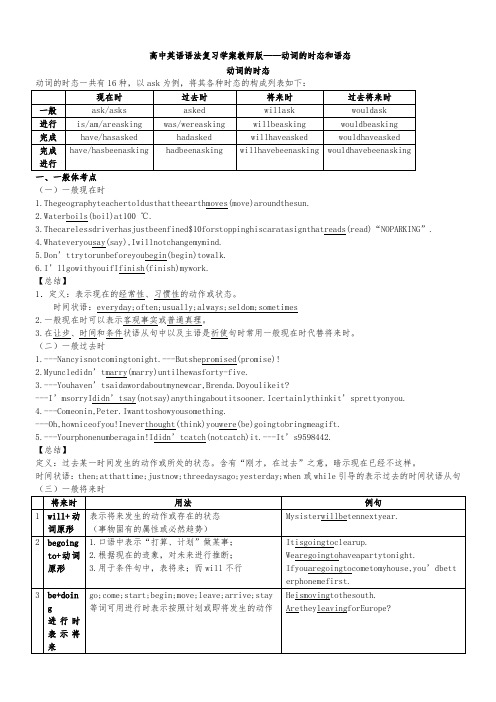
高中英语语法复习学案教师版——动词的时态和语态动词的时态(一)一般现在时1.Thegeographyteachertoldusthattheearthmoves(move)aroundthesun.2.Waterboils(boil)at100 ℃.3.Thecarelessdriverhasjustbeenfined$10forstoppinghiscaratasignthatreads (read)“NOPARKING”.4.Whateveryousay(say),Iwillnotchangemymind. 6.12.3.定义:过去某一时间发生的动作或所处的状态。
含有“刚才,在过去”之意,暗示现在已经不这样。
时间状语:then;atthattime;justnow;threedaysago;yesterday;when 或while 引导的表示过去的时间状语从句【总结】1.定义:将来某一时刻要发生的动作或所处的状态。
时间状语:soon;nextweek;tomorrow等2.beto+动词原形的用法:(1)YouaretodoyourhomeworkbeforeyouwatchTV.=haveto/must“必须“(2)Youaretoreportthepolice.=should/oughtto“应该”7.Selectingamobilephoneforpersonaluseisnoteasytaskbecausetechnologyischanging(change)sorapidly.8.Idon’treallyworkhere.Iamjusthelping(help)outuntilthenewsecretaryarrives.【总结】1.定义1)现在进行时:说话时或现阶段正在发生的动作或存在的状态。
2)过去进行时:过去某个时刻或阶段正在发生的动作或存在的状态。
2.时间状语1)现在进行时:now;rightnow等2)过去进行时:atthistimeyesterday等3.一个长动作为背景,被一个短动作打断,长动作用进行体,短动作用一般体。
初中英语时态和语态复习教案

初中英语时态和语态复习教案一、教学目标1. 熟练掌握英语的基本时态和语态;2. 能正确运用各种时态和语态进行句子转换;3. 加深对时态和语态的理解,提高英语语言运用能力。
二、教学内容时态和语态的复习和运用三、教学过程1. 导入通过展示一张图片或播放一个视频,引导学生回忆过去发生的事情,并让学生使用过去时描述图片或视频内容。
2. 时态的复习(1)现在时态- 用法:表示现在正在进行的动作或状态。
- 结构:主语 + 动词-ing- 例句:I am studying English now.(2)过去时态- 用法:表示过去发生的动作或状态。
- 结构:主语 + 动词过去式- 例句:He went to the park yesterday.(3)将来时态- 用法:表示将来要发生的动作或状态。
- 结构:主语 + will + 动词原形- 例句:They will have a meeting tomorrow.3. 时态转换练习让学生根据给出的句子,将其改写成其他时态,并解释改变的原因和规则。
例题:(1) They are playing basketball now.转换为过去时态:They were playing basketball yesterday.解释:由于动作是在过去发生的,所以需要将现在时态改为过去时态。
(2) I will go to the supermarket tomorrow.转换为现在进行时:I am going to the supermarket now.解释:虽然动作发生在将来,但是现在正在进行。
4. 语态的复习(1)被动语态- 用法:强调动作的承受者而非执行者。
- 结构:主语 + be + 过去分词(动词-ed)- 例句:The book was written by him.(2)进行时的被动语态- 用法:强调正在进行的被动动作。
- 结构:主语 + be + being + 过去分词(动词-ed)- 例句:The car is being repaired by the mechanic.(3)完成时的被动语态- 用法:强调动作已经完成的被动语态。
高考英语总复习学案高考语法专题动词的时态和语态新人教版

高考语法专题:动词的时态和语态1. 一般现在时(do, does, am, is, are)(1) 表示经常性、习惯性的动作或现在的状态、特征和普遍真理,一般不表示一个具体的动作。
常用often, usually, always, sometimes, every day 等。
Light travels faster tha n sound.(2) 表示按规定、计划或安排要发生的情况(这种用法只限于beg in, come, go, leave, arrive, stop, start, ope n 等少数动词): The train leaves at 10 a.m..(3) 表示现在进行时:There goes the bell.Here comes the bus.(4) 在时间和条件状语从句中表示将来:You will catch the train if you hurry up.2. 一般过去时(did, was, were)(1) 表示过去发生的动作、存在的状态或习惯性动作,只表过去,与现在无关。
Who broke the wi ndow?(2) 表示客气,与过去时无关:Would/Could you please give me a hand?3. 一般将来时表示说话时看来将要发生的动作或情况,有多种表达方式:(1) shall(will)do:We will meet you at the airport.(2) be goi ng to do, 打算、准备干;即将发生:Come out! The roof is going to fall.( 此处不用will fall)(3) be to do,按计划、安排发生:They are to hand in their pla n n ext week.(4) be about to do, 就要干某事,不与时间状语连用:We are about to leave.(5) be doi ng,用现在进行时表示按规定、计划或安排要发生的情况:We are leav ing for Beiji ng tomorrow.4. 现在进行时(am/is/are doing) 表示说话时正在进行的动作,与now 连用:They are liste ning to music now.5. 过去进行时(was/were doing)表示过去某时正在进行的动作,动作没有完成:At that time he was working in a laboratory.注意:与一般过去时的区别:He was read ing a no vel last ni ght.( 正在读,没读完)He read a novel last night.( 读完了)6. 现在完成时(have/has done)(1)动作发生在过去,但对现在有影响,与already, just, ever, yet,before, rece ntly 等连用,谓语用瞬间动词:Who has opened the door?( 含义:The door was opened. It isstill open. It ' s cold.)(2) 动作从过去某时开始,一直持续到现在,与for, since 或sofar, these days, in the past five years 连用,谓语用延续性动词:I have been in Beijing for half a month.( 不能用have come, 但可说:He has already come.)(3) 过去动作到现在为的总和。
动词时态和语态复习教案
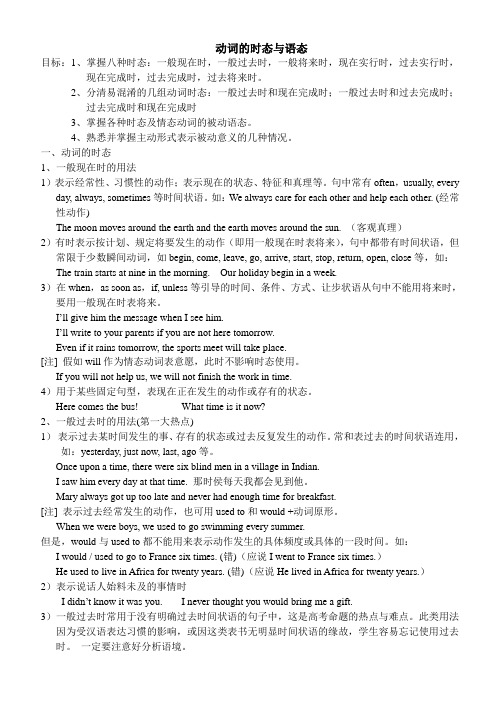
动词的时态与语态目标:1、掌握八种时态:一般现在时,一般过去时,一般将来时,现在实行时,过去实行时,现在完成时,过去完成时,过去将来时。
2、分清易混淆的几组动词时态:一般过去时和现在完成时;一般过去时和过去完成时;过去完成时和现在完成时3、掌握各种时态及情态动词的被动语态。
4、熟悉并掌握主动形式表示被动意义的几种情况。
一、动词的时态1、一般现在时的用法1)表示经常性、习惯性的动作;表示现在的状态、特征和真理等。
句中常有often,usually, every day, always, sometimes等时间状语。
如:We always care for each other and help each other. (经常性动作)The moon moves around the earth and the earth moves around the sun. (客观真理)2)有时表示按计划、规定将要发生的动作(即用一般现在时表将来),句中都带有时间状语,但常限于少数瞬间动词,如begin, come, leave, go, arrive, start, stop, return, open, close等,如:The train starts at nine in the morning. Our holiday begin in a week.3)在when,as soon as,if, unless等引导的时间、条件、方式、让步状语从句中不能用将来时,要用一般现在时表将来。
I’ll give him the message when I see him.I’ll write to your parents if you are not here tomorrow.Even if it rains tomorrow, the sports meet will take place.[注] 假如will作为情态动词表意愿,此时不影响时态使用。
中考英语动词时态复习学案

中考英语动词时态复习学案篇一:河北省辛集市第三中学2013中考英语动词时态——一般过去时复习学案2013中考英语动词时态---一般过去时(复习学案)概念:过去某个时间里发生的动作或状态;过去习惯性、经常性的动作、行为。
时间状语:ago, yesterday, the day before yesterday, last week(year, night,month?), in 1989, just now, at the age of 5, one day, long longago, once upon a time, etc.基本结构:①be动词;②行为动词否定形式:①was/were+not;②在行为动词前加didn't,同时还原行为动词。
一般疑问句:①was或were放于句首;②用助动词do的过去式did 提问,同时还原行为动词。
动词过去式的规则变化:英语中很多动词的过去式是不规则的,有些同学死记硬背,却效果不佳。
我们不妨共同寻找一些不规则动词中的“规则”,这样记忆起来就会事半功倍了。
1.过去式与动词原形同形。
let—let, put—put, hit—hit, read—read[red]等。
2.动词原形以ow/aw结尾,过去式常变为ew。
know—knew, grow—grew, throw—threw, draw—drew等。
但是也有一些例外,例如:show—showed。
3.许多动词只要将动词原形中的元音字母i改为a,就可变为过去式。
begin—began, give—gave, sing—sang, swim—swam, sit—sat, drink—drank, ring—rang但是win—won 例外。
4.有些动词的过去式以o(a)ught结尾。
bring—brought, buy—bought, think—thought, catch—caught, teach—taught[注意]上述动词过去式究竟是以ought还是aught结尾,只要记住“有a则a,无a则o”即可。
- 1、下载文档前请自行甄别文档内容的完整性,平台不提供额外的编辑、内容补充、找答案等附加服务。
- 2、"仅部分预览"的文档,不可在线预览部分如存在完整性等问题,可反馈申请退款(可完整预览的文档不适用该条件!)。
- 3、如文档侵犯您的权益,请联系客服反馈,我们会尽快为您处理(人工客服工作时间:9:00-18:30)。
动词时态和语态编制:高华高鲁丽郭香芹审核:高鲁丽审批:【学习目标】1. 掌握各种时态的基本用法,并能将时态和语态结合起来进行思考问题;2. 能对几种易混的时态进行分辨,并灵活运用;3. 通过练习,能在单选和写作中熟练运用各种时态和语态,能在阅读中透过时态和语态获取信息。
【使用说明】学生先自我感悟,老师再精讲练习,最后学生练习提高。
I 感悟高考2011全国卷II,9If you don't like the drink you just leave it and try a different one.A. orderedB. are orderingC. will orderD. had ordered考点:2011北京卷,21Experiments of this kind in both the U.S. and Europe well before A. have conducted B. have been conducted C. had conducted D. had been conducted考点:On her next birthday, Ann married for twenty years.A. isB. has beenC. will beD. will have been考点:2011浙江卷,15The manager was worried about the press conference his assistant inhis place but, luckily, everything was going on smoothly.A. gaveB. givesC. was givingD. had given考点:2011全国卷,29When Alice came to, she did not know how long she there.A. had been lyingB. has been lyingC. was lyingD. has lain考点:——I didn’t ask for the name list. Why ______on my desk?——I put it there just now in case you needed it.2011安徽卷, 32A. does it landB. has it landedC. will it landD. had it landed考点:II 命题趋势及考纲解读动词时态和语态在高考中的考查重点:1.对下列十一种时态的考查:(统计2011年各地部分高考题)一般现在时(4)一般过去时(5)一般将来时(1)现在进行时(4)过去进行时(2)现在完成时(4)现在完成进行时(2)过去完成时(6)将来完成时(2)过去完成进行时(1)过去将来时(0)2.既考查时态又考查语态(6)(一般将来时/一般现在时(2)/过去完成时/现在完成时/将来完成时);3.考查动词的及物与不及物;4.考查主动形式表示被动意义;5.考查动词词组在被动语态中的介词问题;6.对被动语态习惯句型的考查。
III考点一:一般现在时1. 时间、条件状语从句中,从句用一般现在时代替将来时He is going to visit her aunt the day he _____arrives____(arrive) in Beijing.2. 经常性或习惯性的动作,常与表示频度的时间状语连用。
如时间状语every…, sometimes, on Sundays。
2011全国卷,23Planning so far ahead no sense—so many things will have changed byA. madeB. is makingC. makesD. has made3. 表示按时间表拟定或安排好要发生的动作,用现在时表将来,动词有:come, go, leave, arrive, fly, return, start, begin, open, close, end, stop.The train _____l eaves____(leave) at six tomorrow morning.考点二:一般过去时1.在确定的过去时间里所发生的动作或存在的状态;过去经常性或习惯性的动作;2011北京卷,32——Bob has gone to California.——Oh, can you tell me when he ?A. has leftB. leftC. is leavingD. would leave2. 表示说话人原来没有料到、想到的事。
【2010全国卷II】Excuse me. I _______ I was blocking your way.A .didn’t realize B. don’t realize C. haven’t realized D. was n’t realizing考点三:一般将来时1. be going to do 表示决定或安排要做的事/事先经过考虑的事情;必然或很可能发生的事,也可以表示自然现象。
2. will 说话人认为、相信、希望或假定要发生的事,不含具体的时间,可以指遥远的将来;还可以表示不事先经过考虑的意图,即临时决定。
3. be about +不定式,意为正要做某事,常和when引导的状语从句连用。
He is about to leave for Beijing.注意:be about to 不能与tomorrow, next week 等表示明确将来时的时间状语连用。
4. be +不定式表将来,按计划或正式安排将发生的事。
We are to discuss the report next Saturday.5. 用现在进行时表示将来,表示"意图"、"打算"、"安排",常和以下动词连用come, go, start, arrive, leave, stay等。
如:I'm leaving tomorrow.6一般现在时表将来(见一般现在时第3条)〖10全国Ⅰ〗The discovery of gold in Australia led thousands to believe that a fortune ______.A. is madeB. would makeC. was to be madeD. had made考点四:现在进行时1. 习惯进行:表示长期的或重复性的动作,说话时动作未必正在进行。
Mr. Green is writing another novel.2. 与always, constantly, forever 等词连用,表示反复发生的动作或持续存在的状态,往往带有说话人的主观色彩。
You are always changing your mind.3. 表示动作的未完性、暂时性。
I don’t really work here; I am just helping out until the new secretary arrives.4. 表将来2011湖南卷,22——John, what in your hand?——Look! It’s a birthday gift for my grandma.A had you heldB are you holdin gC do you holdD will you hold考点五:过去进行时:1. 概念:表示过去某时正在进行的状态或动作。
2. 过去进行时的主要用法是描述一件事发生的背景:一个长动作发生的时候,另一个短动作发生My brother____fell___(fall) while he _____was riding______(ride) his bicycle and hurt himself.2011全国卷,24I wasn’t sure if he was really interested or if he polite.A. was just beingB. will just beC. had just beenD. would just be考点六:现在完成时现在完成时用来表示已发生或完成的动作或状态,其结果的确和现在有联系。
动作或状态发生在过去,但它的影响现在还存在;也可表示持续到现在的动作或状态。
1. 下列句型常用现在完成时(1)It is the first / second time…. that…结构中的从句部分,用现在完成时。
It is the first time that I have visited the city.(2)This is the+adj最高级+ that…结构,that 从句要用现在完成时.This is the best film that I____have seen_______(see).2. 非延续性动词的否定形式可以与表示延续时间的状语连用。
即动作不发生的状态是可以持续的。
3. since和for Since 用来说明动作起始时间,for用来说明动作延续时间长度。
并非有for 作为时间状语的句子都用现在完成时。
(2006重庆)I ____ in London for many years, but I’ve never regretted my final decision to move back to China.A. livedB. was livingC. have livedD. had lived4. 在条件、时间、让步状语从句中,表示将来某时间以前已完成的动作。
I will not believe you unless I have seen it with my own eyes.2011陕西卷,12His first novel good reviews since it came out last month.A. receivesB. is receivingC. will receiveD. has received考点七:过去完成时1. 表示意向的动词,如hope, wish, expect, think, intend, mean, suppose等,用过去完成时表示"原本…,未能…"had hoped to doI had intended to help you/I intended to have helped you____(我本想帮你), but I was too busy at the moment.2. no soo ner… than。
